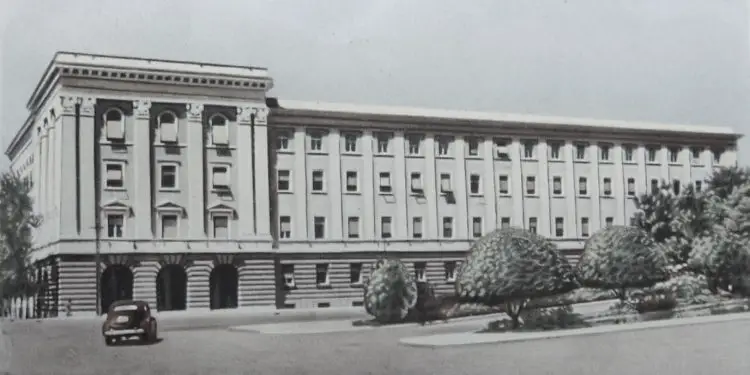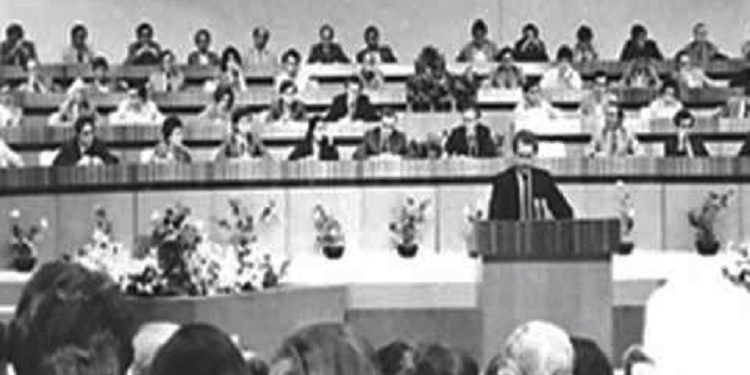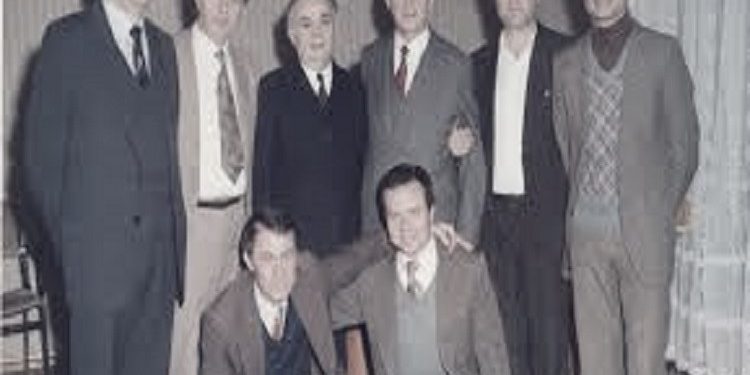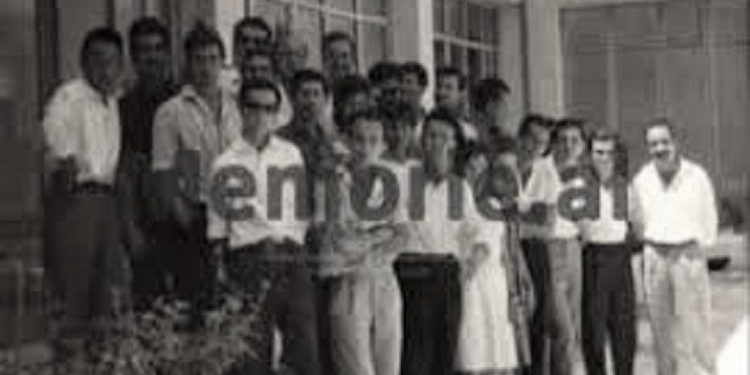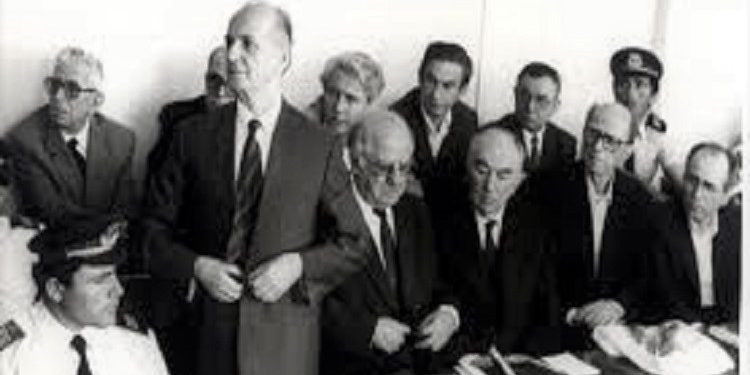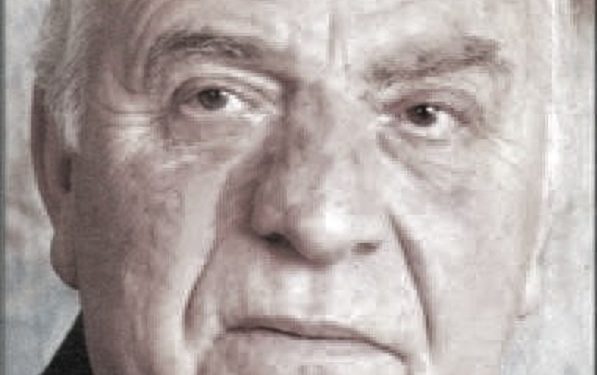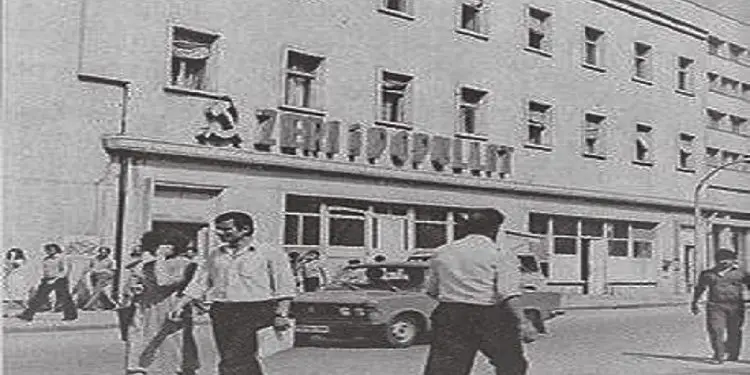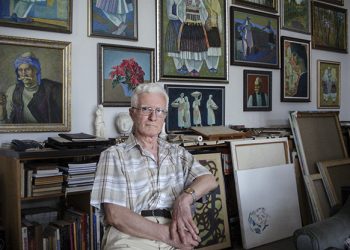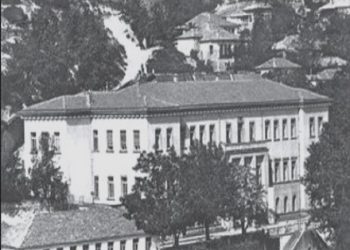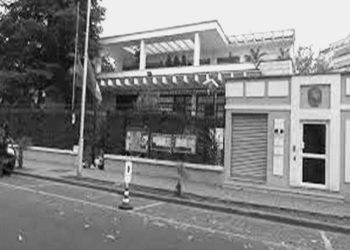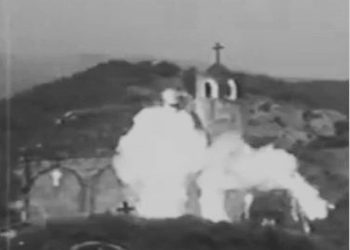By Bashkim Trenova
Part forty-seven
Memorie.al publishes the memoirs of the well-known journalist, publicist, translator, researcher, writer, playwright and diplomat, Bashkim Trenova, who after graduating from the Faculty of History and Philology of the State University of Tirana, in 1966 was appointed a journalist at Radio- Tirana in its Foreign Directorate, where he worked until 1975, when he was appointed journalist and head of the foreign editorial office of the newspaper ‘Zeri i Popullit’, a body of the Central Committee of the ALP. In the years 1984-1990, he served as chairman of the Publishing Branch in the General Directorate of State Archives and after the first free elections in Albania, in March 1991, he was appointed to the newspaper ‘Rilindja Demokratike’, initially as deputy / editor-in-chief and then its editor-in-chief, until 1994, when he was appointed to the Ministry of Foreign Affairs with the position of Press Director and spokesperson of that ministry. In 1997, Trenova was appointed Ambassador of Albania to the Kingdom of Belgium and to the Grand Duchy of Luxembourg. Unknown memories of Mr. Trenova, starting from the War period, his childhood, college years, professional career as a journalist and researcher at Radio Tirana, the newspaper ‘Zeri i Popullit’ and the Central State Archive, where he served until the fall of the communist regime of Enver Hoxha, a period of time when he in different circumstances met many of his colleagues, suckers of some of the ‘reactionary families’, etc., whom he described with a rare skill in a book of memoirs published in 2012, entitled ‘Enemies of the people’ and now brings them to the readers of Memorie.al
Continued from the previous issue
WITH “HEROES OF THE PEOPLE”
POLITICAL BUREAU AND THE PRESIDENCY
I do not want to analyze whether he was right and, if so, how right Liri Belishova was. I have recently read even some hardened critics of her use the same language of class warfare as in communism, but in the opposite direction. I do not want to do the apology of Freedom either. It seems to me that she has responded with endless pain. It seems to me that I cannot add anything more to her words: “Although personally, said Liri Belishova, I am not responsible for crimes, although she and all my family members suffered for 30 years, I apologized and I take this opportunity to apologize again. I apologize to the victims of the dictatorship and their families for everything they have suffered. I apologize to all the people for not fulfilling what we promised during the War, for avoiding for 50 years the right path of development, for its poverty and sacrifices, for its repression and violation of all rights. And, I apologize to my loved ones who suffered so much for my cause, even though I was innocent. I apologize in the first place to my Light, that I gave birth to him, but I could not provide him with a normal life, a pair of happiness “.
From the former senior leaders of the dictatorship, she and Bedri Spahiu, although in different positions, are the only ones who have apologized.
My memories, for Xhelil Gjoni, “the last of the Mohicans”!
I want to dwell somewhat on these notes even on the “last of the Mohicans” of the Albanian communist dome. I had to work for about a year with Xhelil Gjoni, whom I had as editor-in-chief in “Zeri i Popullit”. He would soon leave the newspaper and ascend the stairs of the pyramid of power, first as a member of the Central Committee and then as a member of the Politburo and Secretary of the Central Committee of the Party. Xhelili will be the last “comet” of the dictatorship. He ascended to the heights of power, as his savior, to fall with him, without glory.
For the first time, I met Xhelil Gjoni in a meeting of media workers in the hall of the League of Artists and Writers of Albania. At that time I was still a journalist for Radio Tirana. Thanas Nano spoke at this meeting, as the Director of the biggest propaganda machine of the Party, the Albanian Radio Television. He demonstrated his position through a contempt or cynicism towards those present. Xhelil Gjoni was also in the hall. This, being the editor-in-chief of the central body of the Party, the newspaper “Zeri i Popullit”, could not accept orientations or instructions from Thanas Nano. It was the “Voice of the People” that guided the other means of the Party’s press and propaganda. Xhelili got up immediately after Thanas Nano sat down and, with an arrogant look of a triumphant tone, put the dots on “ï”. I was then glad that there was someone who publicly challenged Thanas Nano, who in some way, regardless of motive, showed him the place. Many of my colleagues agreed with me. On this occasion I learned from them that Xhelili was the son-in-law of Hysni Kapos, or his brother-in-law. Xhelili was married to Lumton, Hysni Kapos’s sister. He did not lack ingenuity and ability, but it was this marriage bond on which his entire career was strongly supported. It was this connection with Hysni Kapo, one of the three main communist leaders in Albania that multiplied his valuesundeservedly. It was the name of Hysni Kapos, who “amortized” in public, at work and in society his many shortcomings and defects as a character and as a temperament.
Forced maneuvers of the veteran of “Zeri …”, Qako Dango, to please Xhelil Gjoni!
In my beginnings in “Zeri i Popullit”, the relationship with Xhelil Gjoni was more than normal, even benevolent on his part. I saw Xhelili as very dedicated to his very delicate and equally responsible task. I reasoned this even when, not infrequently, he erupted in shouts and shouts, which he followed with an apology, to return to them again. I was not impressed at the beginning by his request for the column “Voice of Albania – Voice of Truth”. Veteran of “Voice of the People”, Qako Dango, was in charge of its preparation. He received letters from the Central Committee of the Party, which came to Radio Tirana from its foreign listeners. Qako edited them and, like any other material published in the newspaper, submitted them to the editor-in-chief, Xhelil Gjoni, for approval. He, as a rule, returned the material submitted with the note: “find other, better letters”. He knew very well that Qako had nowhere to find other letters. Qako in turn had found an original solution. He himself invented a letter ostensibly coming from some American country. In this case its non-existent author was “identified” with two initials, for example: “L. K. ” from Colombia writes … ”! He laughed out loud at his finding. “No one has to suspect that a K.L. or L.K. lives in Colombia, who wrote like this “, Qako explained. Another finding was the deep “plowing” of incoming letters. He edited them so much that they had almost nothing left of the original. Qako continued like this until Xhelili was satisfied with the content of the letters of the “listeners” of Radio Tirana.
I, who had worked in Radio before, knew that in fact even the “originals” that came to Qakos were not original at all. At Radio Tirana, the letters of foreign listeners were translated into Albanian and then viewed by the Director of Foreign Radio, Kiço Pandeli. Kiço, who did not know any foreign language, noticed that their translation had not been done correctly by the specialists! He “corrected” the shortcomings of the translation by adding, of course, the praises and hymns for communism, the Party and comrade Enver Hoxha. Xhelili was not satisfied with these “adjustments” either. In the same vein, he was even more “demanding.” I, however, respected him and at the same time tried to keep the same distance, as if to stay in the place that belonged to me as a newly arrived journalist in “Zeri i Popullit”.
I believe that Xhelil Gjoni was also satisfied with my articles. He also expressed this in the weekly analysis of the work in the editorial office or, as we called them then, in the “criticism of the week”. It was he who nominated me as chairman of the newspaper’s Professional Unions. It will again be he who nominated me as a member of the bureau of the Party organization. It is Xhelil Gjoni who also proposed me for a trip to Sweden. This would be, if realized, my first outing abroad. It was not done and I do not know why. To inform me about this trip, Spiro Kufo, a wise man, a senior journalist of the “Voice of the People” and deputy chairman of the Party organization, called me to his office. No one told me afterwards that the road to Sweden would not be made nor why it would not be made. Nils Anderson, who at the time lived in Sweden, will explain to me after a few years, in Tirana, that it was the Sweden-Albania Friendship Association, which had organized an activity in which it was originally intended to be a guest from Albania. Then, I do not know why, the Association withdrew this invitation.
Not appointing Fatos Cekodhima, as editor-in-chief of the newspaper “Bashkimi”!
Even today, after more than 35 years, I think that the problems with Xhelil Gjoni started without any real reason, even quite suddenly. Fatos Cekodhima, head of the Economic Sector and at the same time secretary of the basic organization of the Party, had complained to Xhelil Gjoni, that I, together with my colleague and friend, Vladimir Prela, were glad that he had no stain on his biography! It seems absurd, but it’s true. Normally he would have to complain if someone slandered him, saying that he was “stained in the biography”. But, as in other cases, even in this case, based on all the parameters of the dictatorship, the absurd was logical and the logic absurd. I will try to explain.
It all starts with the appointment of Arqile Aleksi, editor-in-chief of the second daily newspaper, “Bashkimi”, as director of the Albanian Telegraphic News Agency. Following his departure, the People’s Voice Party’s organization was asked by the Party Central Committee to make a work characteristic of Fatos Cekodhima. He was supposed to become the new editor-in-chief of “Bashkimi”, thus replacing Arqile Aleksin. The Party organization made a pretty good feature of Fatos. Despite her, he never became the editor-in-chief of the newspaper “Bashkimi”. The employees of this newspaper did not want to have Fatos Cekodhima as their editor-in-chief. In fact, he, by nature and character, was completely different from Arqile Aleksi, a man with a lot of humor, communicative and kind to his colleagues. I myself have not heard either at that time or after, any unfavorable or malicious opinion towards Arqile Aleksi.
The non-appointment of Fatos as the editor-in-chief of “Bashkimi” also raised whispers among the journalists of “Zeri të Popullit” and “Bashkimi”. It was rumored that he could not become editor-in-chief because there was something wrong with his biography. One day, on the steps of the “Voice of the People” entrance, while we were going out for a coffee at the Journalists’ Club, Vladimir Prela and I crossed paths with Pavlo Gjidede, our colleague of the “Voice of the People”. He stopped us and told us he had learned the good news. According to this news, Fatos Cekodhima had nothing unfavorable in his biography, so the way was open for Fatos editor-in-chief. Vladimir, who had known Fatos for a long time than I do, meets him and expresses his joy. As soon as Fatos leaves Vladimir, he goes to Xhelil Gjoni and asks him for explanations about the words that were spread about his biography. Xhelili called me and Vladimir. We told them as much as we knew. He called Pavlo Gjideden. Pavllo immediately denied having talked to us about Fatos Cekodhima. Xhelili for several weeks insisted on putting pressure on me and Vladimir, to tell the truth, otherwise the responsibility fell on both of us, as I said spread the foundations.
I said and say, they have a negative charge. You cannot say and say, or call such a positive conversation, which is addressed quite kindly to someone else, a colleague or a stranger. This was the case in our case, even if we thought that the conversation about the spotless biography of Fatos Cekodhima had its origin in me or Vladimir. To deal with what I said and said in “Voice of the People” was not only morally punishable, but also punishable, even the punishment was known to be quite severe. Xhelili finally did not mention Fatos’s biography anymore. I believe he needed it so much. It was enough to have a black card in his hand, which he could shake or toss at any moment against each other. If the biography of Fatos had not been the subject of conversation, he would surely have found something else to show, that he was the god of the fate of the whole team, as well as of each of us, for better, but also for worse. , that our name might become known or eventually lost, even depending on his whims. The relationship with Xhelili became tense, and even eventually broke down, not long after. This time, to some extent he was right and likewise, to some extent I was in charge.
My conflict with Xhelil Gjoni, which was never recovered!
In May 1976, as every year in this month, a series of artistic spectacles were organized in Tirana known as “May Concerts”. In this highly propagated artistic activity, during ten days, many ensembles, groups, orchestras, professional and amateur singers and dancers competed. “Concerts of May” I think were the most important and most massive artistic event of the year on a national scale, despite the fact that it represented only the capital. They served as a kind of noisy tribune, where the achievements and successes of the culture and art of socialist realism were advertised. Having a pronounced ideo-political character they, like any artistic and cultural activity, also played their part of the role in the intensive washing of our brains.
“Concerts of May” 1976, flowing confident in this bed, had a feature that had attracted the attention of dictator Hoxha. In a meeting in the Politburo, in the meetings of which, as a rule, the editor-in-chief of “Voice of the People” was always present, Enver Hoxha had issued some criticisms in their address. This time his target was the State Ensemble of Folk Songs and Dances. He had criticized the stylization of the folk costumes of the Ensemble dancers, as well as his dancers who, according to the Albanian dictator, had appeared on stage as delicate, fragile accessories. Of course he was neither a stylist nor a choreographer, but his word in these fields was law and above law, just as he was in extracting oil, planting potatoes and wheat, combing and cutting hair, beards of mustaches, in military strategy as well as planetary perspectives, etc., etc.
Xhelil Gjoni, who had been present when Enver Hoxha had made the above statements, as soon as he returned to the Editorial Office, called all the journalists to give us case orientations. He also told us about Enver Hoxha’s criticism of the State Ensemble of Folk Songs and Dances. At the meeting of the Editorial Board, when the orientations of the highest leadership of the Party were given for the “Voice of the People”, in a silent corner, there was always an employee who also did the job of stenographer. He took note of everything that was said there. None of us ever had the question: “Why did he need his notes”?!
After Xhelil Gjoni finished giving random directions, we all left. I went to have a coffee at the Hotel “Tirana”, which was located near the building of “Voice of the People”. There I met my old friend Bardhyl Zekia. He worked as a cultural instructor in the Tirana Party Committee. As he was a party employee and, moreover, in the field of culture, I talked to him about Enver Hoxha’s criticism. I told them, of course, that I had been informed of them, like all my colleagues, by the editor-in-chief, Xhelil Gjoni. Herein lays my mistake. I should not have had this conversation with Bardhyl Zeke. I could not think then that two communists, like the two of us, could not always speak or transmit to each other the orientations, criticisms, opinions of the Party chairman, and that this was allowed only by his order. I did not know, I could not think that Enver Hoxha had spoken not for the whole Party. I did not know nor could I think that Enver Hoxha had spoken, but that Xhelil Gjoni should not have conveyed his criticisms to us, telling us their author. Enver Hoxha had thrown the stone and hid his hand. I could not think that the “great leader”, who challenged the superpowers with his courage, followed practices of this nature. He was removed as principled over principled. He had punished God more severely than anywhere else, and only ever because the Almighty, as the believers turn to him, dared to overshadow his unwavering “principles” with universal force!
For his part, Badhyl Zekia, after leaving me, returns to the Tirana Party Committee. There he meets the member of the Politburo and at the same time the First Secretary of this Committee, Manush Mufti. Bardhyl tells him, I do not know under what circumstances, the conversation we had together at Hotel Tirana. Manushi, frightened, did not want to keep to himself what he had been told by Bardhyl. He noted above. There, in the dome, they decided to call Xhelil Gjoni and listen to his version, regarding the conversation that had taken place in the Editorial Office, after Enver Hoxha’s criticism of the “May Concerts”. Xhelili hurried to deny everything.
Upon returning to the Editorial Office, Xhelil Gjoni summoned to his office the Editorial College and the Bureau of the Party organization, of which I was also a member. Normally, or rather, theoretically, he could not call the Bureau of the organization to his office. The bureau could do that, call it that. Theoretically it was said that the Party was above all and everything. This formula, in fact, was all valid only for the dictator. By unifying with the Party, he was above anyone and everything. Under his model, the petty dictators appointed by the Party to their posts, unified in these posts even those with the Party. The party was in fact something abstract that was concretized only by them. This had never happened in “Zeri e Popullit” and in any institution, work center and production in Albania, that the editor-in-chief or the director was called by the Bureau of the organization, and answered before it. The opposite was the most normal practice, a completely normal abnormality.
How I had inadvertently influenced the non-realization of Xhelil Gjoni’s dream!
In his office Xhelil Gjoni told how he was called to the Central Committee of the Party. According to him, they told him that they were sure that he had not talked to journalists in the Editorial Office about Enver Hoxha’s criticism of the May Concerts. I, he told us, “Did not talk to the Editorial Board about the May Concerts, the Union has misinformed the Party”. Stuck in complete hysteria, he addressed me with the words: “You want to overthrow me”?! There was something real behind these words that I had not thought of for a moment. A few months later, in November 1976, the 7th Party Congress was to be held. He expected that at the end of the work of this Congress, he would be elected a member of the Central Committee of the Party. He saw his dream on the verge of being realized.
Xhelil Gjoni then asked all those present to express them and tell the truth. Everyone, almost without any nuance, supported him. The two deputy editors-in-chief, Ajet Simixhiu and Asim Bedalli, made an exception to the general rule. Ajeti said that he did not remember whether or not Xhelili had spoken to reporters about the “May Concerts”, but despite this fact, as he added, I had made the mistake of talking to Bardhyl Zeke about the above. The verse was the only one from the members of the Collegium and the bureau, which did not blindly “solidarize” with Xhelili, left something controversial. I can say that I saw the verse, on one occasion, in his office in a position similar to mine. Immediately after a meeting he had with Xhelili, in his office where I was the only one present, he, after telling me: “I was made to jump out of the window”, added as a groan from his soul the words “Oh my mother”!
The other deputy editor-in-chief, Asim Bedalli, also remained in my memory for his words at this joint meeting of the bureau of the Party organization and the Collegium. “I ‘, said Asimi,’ was not at the meeting of the Editorial Office where, as Bashkimi says, comrade Xhelil spoke about the criticism of comrade Enver for the” May Concerts “, however, he added, I am sure that comrade Xhelil, “he did not speak at this meeting about these criticisms.” Asim and I have known each other since we were students. He was the youth secretary of the Faculty. Even in my student years, he had always left me with a mixed, indeterminate taste. He was like all of us, young in age, but unlike almost all of us, unscrupulous arrivist.
These were the communists of the organ of the Central Committee of the Party, those otherwise known as “architects of revolutionary thought”, the conductors of pure and courageous proletarian ideology and morality in the bosom of the Party and the people! Everyone asked me to do self-criticism. Xhelili also asked me to do self-criticism and go to the Committee of the Tirana Party, to meet there the First Secretary of this Committee, Manush Mufti, and to testify to him that he, Xhelili, had not spoken in the Editorial Office about “Concerts of May”. Xhelili demanded neither less nor more, but simply for me to make a “harakiri”, to bury my dignity, and with it, any future for the sake of his political career. At the very least, he demanded that I, denying having talked to Bardhyl Zeke about the May Concerts and Enver Hoxha’s criticism, expose him as a liar and misinformed. For him it did not matter the truth, or the fate of one or the other, the fate of two simple communists, their friendship or society, but only his career, clearing the stairs of this career from every obstacle, ignoring every human morality. Memorie.al
The next issue follows




